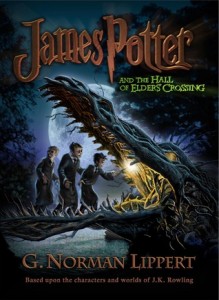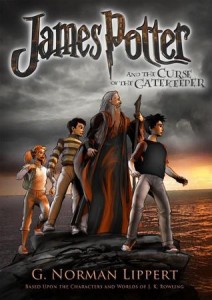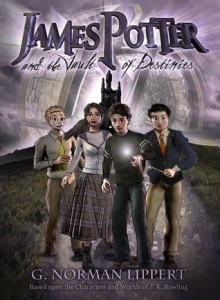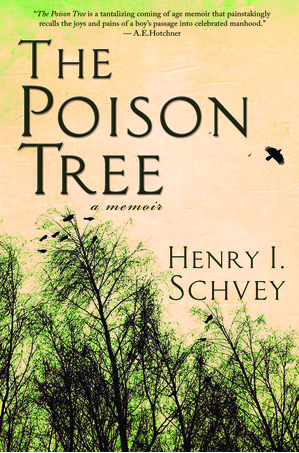G. Norman Lippert and the Son of Harry Potter
Share the post "G. Norman Lippert and the Son of Harry Potter"
 If you’ve read any of my writing here, you know that Harry Potter and the world of wizards created by JK Rowling ranks high on my list of favorite books. Like many others, I’ve been torn as to whether I want to see more stories about The Chosen One or if I want the story to be done and enjoy the memories.
If you’ve read any of my writing here, you know that Harry Potter and the world of wizards created by JK Rowling ranks high on my list of favorite books. Like many others, I’ve been torn as to whether I want to see more stories about The Chosen One or if I want the story to be done and enjoy the memories.
One St. Louis resident doesn’t struggle with such conflicting feelings. G. Norman Lippert, a transplanted Ohioan who has lived in Saint Louis for more than a decade, has taken it upon himself to continue Rowling’s stories with Harry’s son, James, leading the way for new adventures at Hogwarts.
Fan fiction isn’t anything new. Star Wars, Star Trek, Lord of the Rings, and pretty much any story worth telling has been re-told in a horde of different ways over the years, some good, some just plain awful.
What Lippert is doing is beyond fan fiction. Far beyond it.
His work has basically been accepted by fans as the one true continuation of the Potter legend. Even Rowling herself has given her blessing. I recently chatted with Lippert about his writing, his inspiration, and, of course, his foray into the world of wizards.
Kurt Bali: So when did you start writing?
G. Norman Lippert: I’ve always written, but I’ve also always created art. As a kid, it was a lot easier, and frankly more immediately gratifying, to show someone a drawing rather than a short story. As a result I never took my writing very seriously. Instead, I became a professional artist and relegated my stories to a fun side hobby, almost exclusively for my own amusement.
I only released one book prior to 2007, a little self-published novella called Flyover Country. It was a lark, a story I really loved and had written in one feverish long weekend, but that’s all. When the Harry Potter stories ended, I was hungry for more, so I did what I always did, I just started writing a fun little addition. It grew, became a full length novel, and I decided to throw up a website for it. I had almost no idea at the time what fan fiction even was. I told myself I’d be happy if a hundred people read it. The result was overwhelming, and I’ve been writing seriously ever since.
KB: What’s your background?
GNL: I grew up in northwest Ohio and always loved reading and drawing. Storytelling was always a huge passion for me, but I spent almost all of my time doing it visually, with drawings and comics.
Eventually, I discovered 3D computer animation and fell in love with it. Now, that’s my full time gig, mostly freelance, and, obviously (http://www.jamespotterseries.com/) , I am able to use my 3D and web design skills to augment and promote my stories. It’s very helpful, to say the least.
KB: Who are your influences, besides Rowling?
GNL: Ironically, I wouldn’t call JK Rowling an influence. I love her stories, of course, although I have not yet read Casual Vacancy. I probably shouldn’t admit it, but I think I fell much more in love with Hogwarts than I did with Ms. Rowling. I respect and admire her in the same way I would respect and admire the parent of someone I was madly in love with. Anyway, my main influences are probably George Orwell, HG Wells, Stephen King, and C.S. Lewis. A diverse crew. I would love to have dinner with all of them at one. What a night that would be!
KB: You picked a pretty popular franchise to expand upon. How has the reception been for the Potter series?
 GNL: The whole experience has been surreal. Initially, the release of the first book spawned a raft of hate mail — people claiming my stories had “ruined Harry Potter” and that I was a talentless hack. This tapered off quickly, however, and was replaced with a frankly shocking amount of positive feedback and personal notes of thanks.
GNL: The whole experience has been surreal. Initially, the release of the first book spawned a raft of hate mail — people claiming my stories had “ruined Harry Potter” and that I was a talentless hack. This tapered off quickly, however, and was replaced with a frankly shocking amount of positive feedback and personal notes of thanks.
Now, the stories collectively have a four-star average rating at Goodreads with thousands of reviews. I’ve stopped officially keeping track of downloads, since the stories are hosted in so many places and have been translated into so many different languages, eight at last count, but the English versions on my own website have been downloaded well over a million times worldwide. Despite the fact that I can’t make any money from them — a reality I don’t object to — I have somehow managed to get what every writer wants: readers. That, more than anything, is the most encouraging and exciting part of the whole experience.
KB: Rowling has been both gracious and litigious when it comes to those who have continued the story of Harry Potter. She supports sites like MuggleNet, but came down pretty hard against the author of the Harry Potter Encyclopedia. Has she taken notice of your work?
GNL: She did. When the first book made international news, I was at first thrilled, then I was terrified. I just knew that Ms. Rowling and her people meant to sue me senseless. I contacted them via the Christopher Little Agency and they were more-or-less waiting to hear from me. They said that they had no intention of legal action, despite what the newspapers were saying, and were extremely cordial and supportive.
KB: The adventures of James Potter aren’t your only books. How has the Harry Potter series inspired your other writing projects?
GNL: I think a big part of the reason that Harry Potter had such a broad appeal in the adult demographic is that it was a complex and well-crafted story that featured an overtly-evil villain and a classical good-versus-evil quest. I think as adults, we had eschewed such simple conflicts in favor of more complex and ambiguous good guys and bad guys. We didn’t realize how much we missed the simple satisfaction of a battle against overt evil. This, I expect, is what I take away from the Harry Potter series.
And yet, even here, my main conflict involves ambiguously good and bad characters. A main character, Petra Morganstern, is still undecided. Will she be the source of ultimate redemption? Or will she be the hand that brings destruction? I am still dealing with extreme evil and good, and yet I can’t seem to resist putting them both into the same character just to see what will happen.
KB: I stumbled on your books at Goodreads and was pleasantly surprised to see you live in St. Louis. How long have you lived here?
GNL: Ten years now. I came here for my first digital animation job out of college — hadn’t even graduated, and still haven’t — and just never left. I’ve had two kids here and my wife and I both feel like official St. Louisans now. We can’t see ourselves leaving anytime soon.
KB: What are your ultimate goals as a writer?
GNL: Despite my worldwide readership, my ultimate goal as a writer is to write something that hits the mass market. In a word, I deeply desire affirmation. From the “established” literary world. The “catch 22” is that fan fiction is the kiss of death in the mainstream publishing world. Fortunately, I did get some affirmation from an unlikely source. I went to a writer’s boot camp with Orson Scott Card, author of Ender’s Game and many others.
He was harsh but fair with the stories that were written during that week, but mine he liked enough to buy on the spot for his literary magazine. That was completely unexpected and blew all of us away. That, I suppose, gave me the confidence to say, with conviction, “OK, I’m a writer.”
KB: You’ve taken the works of a great writer and have put your own unique stamp on it, which is no mean feat. Obviously, you have an affinity for Harry Potter, but what book have you read and thought “Man, I wish I would’ve thought of that”?
GNL: Truthfully? Fifty, freaking, Shades of Grey. It’s not the writing that sells that book, as everyone likely knows. It’s the fact that somebody finally had the gall/guts/temerity to write a romance novel with loads of kink in it. Who knew that so many people, specifically women, wanted that? I could have done far, far better with the material than what the original writer did. It’s a far cry from Harry Potter fan fiction. It’s Twilight fan fiction, of course, but I’m versatile. Heh!
KB: What are you reading right now?
GNL: Just digging into Stephen King’s new fantasy story. I’ve always been a huge fan of his Dark Tower stories and feel they have never gotten the attention they deserve.
KB: I’ve always felt artists should give back to those just starting out. What’s the best piece of advice you can give to a young writer?
GNL: This applies to any creative endeavor: first, be willing to be terrible at it for a long, long time before you ever make anything that might be considered good. Second, just do it. Write stuff. Write endlessly, with almost no expectations of hitting it big. None of us will likely be the next Stephanie Meyer (and really, as writers, we shouldn’t want to be).
Instead, if we get anywhere, it will be inches at a time, slogging through word after word, page after page, almost all of it being terrible for a long, long time. If we are willing to do that…then it won’t surprise us at all when we finally get really good. It will only surprise the rest of the world, who had not been paying attention up to that point.
———————–
You can follow Lippert on his Twitter account at @GeorgeZilla, his WordPress page, or at his James Potter website at JamesPotterSeries.com.





